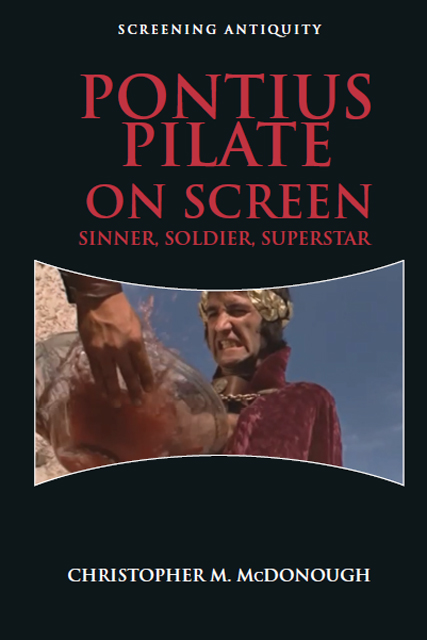Book contents
- Frontmatter
- Contents
- List of Figures
- Acknowledgements
- Series Editors’ Preface
- Frontispiece
- Prologue: ‘Do You Enjoy Being a Symbol, Pontius?’ The Trial of Pontius Pilate and Governor Collins
- 1 Quod Scripsi Scripsi
- 2 The Silent Pilate
- 3 The Roman in the Living Room: Pilate on TV in the Early 1950s
- 4 Mrs Pilate: Claudia Procula and Clare Boothe Luce
- 5 Pilate in CinemaScope, or Notes on Roman Camp
- 6 Finding Meaning in the Middlebrow: Pilate in the 1960s
- 7 What Is Truth? Pilate as 1970s Moral Relativist
- 8 Michael Palin’s Accent in Monty Python’s Life of Brian, and a Few Others
- 9 Grand and Not-So-Grand Inquisitors of the Reagan Age
- 10 ‘We at War’: Pilate for the New Millennium
- Epilogue: A Time of Handwashing
- Works Cited
- Index
6 - Finding Meaning in the Middlebrow: Pilate in the 1960s
Published online by Cambridge University Press: 03 June 2023
- Frontmatter
- Contents
- List of Figures
- Acknowledgements
- Series Editors’ Preface
- Frontispiece
- Prologue: ‘Do You Enjoy Being a Symbol, Pontius?’ The Trial of Pontius Pilate and Governor Collins
- 1 Quod Scripsi Scripsi
- 2 The Silent Pilate
- 3 The Roman in the Living Room: Pilate on TV in the Early 1950s
- 4 Mrs Pilate: Claudia Procula and Clare Boothe Luce
- 5 Pilate in CinemaScope, or Notes on Roman Camp
- 6 Finding Meaning in the Middlebrow: Pilate in the 1960s
- 7 What Is Truth? Pilate as 1970s Moral Relativist
- 8 Michael Palin’s Accent in Monty Python’s Life of Brian, and a Few Others
- 9 Grand and Not-So-Grand Inquisitors of the Reagan Age
- 10 ‘We at War’: Pilate for the New Millennium
- Epilogue: A Time of Handwashing
- Works Cited
- Index
Summary
The great American proposition is ‘religion is good for the kids, though I’m not religious myself’.
– John Courtney Murray, S. J., quoted in Time’s ‘Is God Dead?’ issue (8 April 1966)‘Of the three most recent stabs – le mot juste, I think – at the Christ story’, wrote Dwight MacDonald in his review of The Greatest Story Ever Told, ‘Nicholas Ray’s King of Kings is lowbrow kitsch, Pier Pasolini’s The Gospel According to St. Matthew is highbrow kitsch, and the present work is the full middlebrow, or Hallmark Hall of Fame treatment’. We will come to George Steven’s Greatest Story later in this chapter – and perhaps come to the same conclusion about its value as a film as well – but before we proceed to consider further these various Hollywood versions of Jesus and company, it is worth stopping to take the full measure of MacDonald’s scorn into account. ‘It seems to be impossible for this Christian civilization to make a decent movie about the life of its founder’, the critic began this particular review, even as a few years earlier he had said of Ray’s King of Kings: ‘The genre is hopeless and that’s that’. For MacDonald, what was offensive about the big-screen Biblical epics was that they were entertainment of the lowest-common-denominator variety, made at an unjustifiable expense for the sake of still more unjustifiable profit. In his eyes, they were an offense against good taste. Now, perhaps it would be churlish to point out that these holier-than-thou pronouncements did not appear in Partisan Review or some other highbrow journal but in the decidedly middlebrow Esquire – where, on the page after his review, there ran ads for elevator shoes and a brand of boxers called ‘Ah Men!’ Yet, there can be no doubt that MacDonald was one of the most significant cultural commentators of his day, one who, in insisting that mass culture deserved serious engagement, almost singlehandedly invented the concept of the ‘public intellectual’. To hold even the most popular of art forms to the highest of critical standards was not a duty ever shirked by MacDonald, whose witty reviews influenced filmmaking in general and the reception of particular films for decades to come.
- Type
- Chapter
- Information
- Pontius Pilate on ScreenSinner, Soldier, Superstar, pp. 113 - 139Publisher: Edinburgh University PressPrint publication year: 2022



